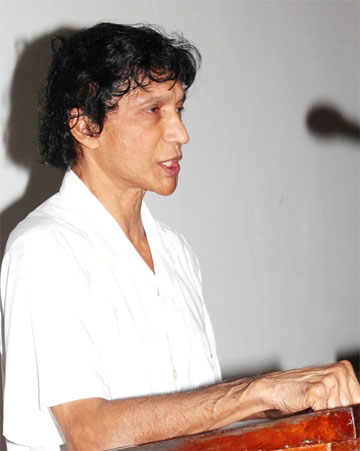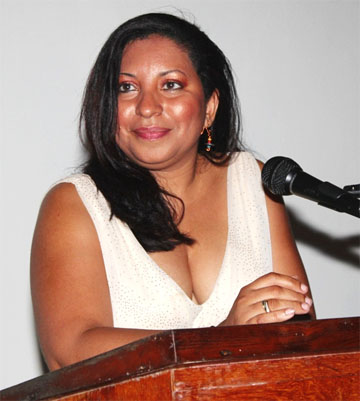UNIVERSITY OF GUYANA, Tur-keyen, Georgetown – Guyanese film producers are calling for private/public partnerships to help fund the reviving local film industry.
Speaking at the recent premiere of three locally-produced short films under the theme ‘Femme’, producer Richard Pitman highlighted the need for the public/private mix.
“I am hoping that more support is given by the private sector and the government to nurture the film industry,” Pitman said.

Pitman, who produced To the Night a film focusing on the struggles of a single mother, forced into prostitution to help financially support her family, said notwithstanding their money troubles, Guyanese film producers maintain their enthusiasm.
Speaking on the self-sacrifice of cast and crew to complete the three films, Pitman said that during the shooting, actors, actresses, directors and writers “worked even during the wee hours in the mornings to complete the project on schedule.”
This, he said, is despite not receiving anything tangible financially due to inadequate funding.
“It touched my heart because it shows that people have a real passion for this. We need the support in order to survive,” Pitman stated.
To the Night was the second film produced by the University of Guyana (UG) Communications major student.
The red carpet premiere of “Femme” featured three local films: To the Night, Ruth and Choices and was held at the Avinash Cinema, Water Street, Georgetown.
Charmaine Blackman, known mostly for her singing career, and who produced Ruth, echoed Pitman’s call.
“Without finances, there is nothing much we can do,” Blackman said.
She said it would be sad to see the work of young writers “left on paper” because they cannot get the financial support needed to transform their stories into films.
“We came from strong with If Wishes Were Horses then there was a lapse. I believe that we can progress and move on in the industry if we get the support we need,” Blackman said.
Director of To the Night, Kojo McPherson, feels the same way too.

“We work so hard but the painful thing is a lack of resources, not only money but personnel and time,” McPherson said.
He said lack of money, personnel and time can “daunt the spirits of young film makers”.
But Mc Pherson is optimistic that, “love for the profession will allow the creative spirit to beat in the hearts of all Guyanese film makers”.
Comedian Lyndon ‘Jumbie’ Jones who attended the premiere is also hoping that finances will be easily available in the future for local productions.
“I have done movies (and) the short time that you have to spend there takes away from whatever else you have to do for a living and you are not adequately compensated,” Jones explained.
He said with the return of the big screen in Guyana, such as the Avinash Cinemas, filmmakers must negotiate to get money for their films once shown at the theatres.
“The financial aspect got to come into place,” Jones emphasised.
He said other projects are in the pipeline but film producers “are just waiting on finances to jump start their work”.
Meantime, Prime Minister Samuel Hinds noted that Guyana was making small steps, which can lead to bigger things in the future as it relates to the establishment of a professional film industry.
The Prime Minister said while he welcomes calls to aim high and follow professional film protocol, he wants that this be not constraining but a platform on which to build.
He noted that Guyana had made a start with films like If Wishes were Horses and Operation Makonima, which saw actors Habeeb Khan and Malcolm Panday starring respectively.
‘Where do we go from here and can we sustain film making in Guyana?” he asked. In answering his own question, the Prime Minister Hinds said he is upbeat about the survival of the film industry because of favourable conditions today for local film makers, including more resources and technology.
“We need to integrate Hollywood, Bollywood and Nollywood with our own local traditions past and present, we can produce products with a Guyanese flavour,” Hinds said.

Meanwhile, Dean of the Faculty of Social Sciences at the University of Guyana Dr Paloma Mohamed welcomed the return of the “big screen” in Guyana. Mohamed who is also the executive producer of the three films said such a return should not be underestimated.
Mohamed said while it was not a walk in the park, she was happy to know that CINEGuyana was helping to showcase Guyana in the films.
“Clearly, there is a market and there is a need for these kinds of stories. The reactions we get from a Guyanese audience overseas, when they see films that celebrate themselves, and seeing people who look and sound like themselves is resounding gratification,” she added.
According to Mohamed, Dr Bruce Paddington who heads the film department at the University of the West Indies (UWI) visited Guyana last year and worked with CineGuyana in coaching the local film producers and actors. However, despite receiving $1.5 million from the Georgetown Chamber of Commerce this year, the team could not have afforded to hire a consultant, and the producers and directors had to work by themselves.
Mohamed expressed ap-preciation to the Chamber for its contribution while lauding the efforts of Malcolm Panday, owner and manager of the Avinash Cinema for supporting the local arts.
Panday who also addressed the patrons encouraged local film makers to continue to produce movies. He said he is making a special effort to invest in equipment that can accommodate Guyanese films.

He explained that the accommodation at the cinema is not up to the standard his management team had initially envisaged, which was due to the lack of finances.
However he said but “money is on the way.” This money, he revealed, will come from a property they own which they plan to mortgage. He revealed that funds will also be used to upgrade and complete the drive in cinema, the other indoor cinemas and other entertainment facilities.
Panday is also hoping to make some investment in the production of local movies made from locally authored books.





